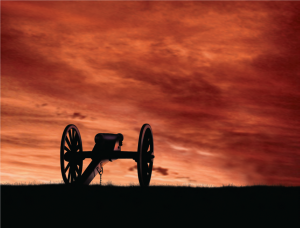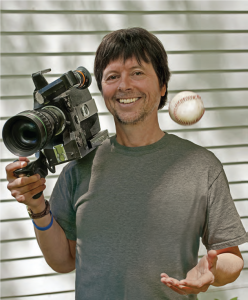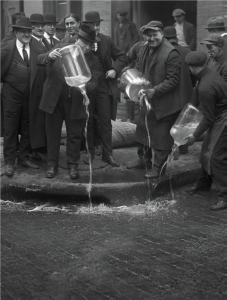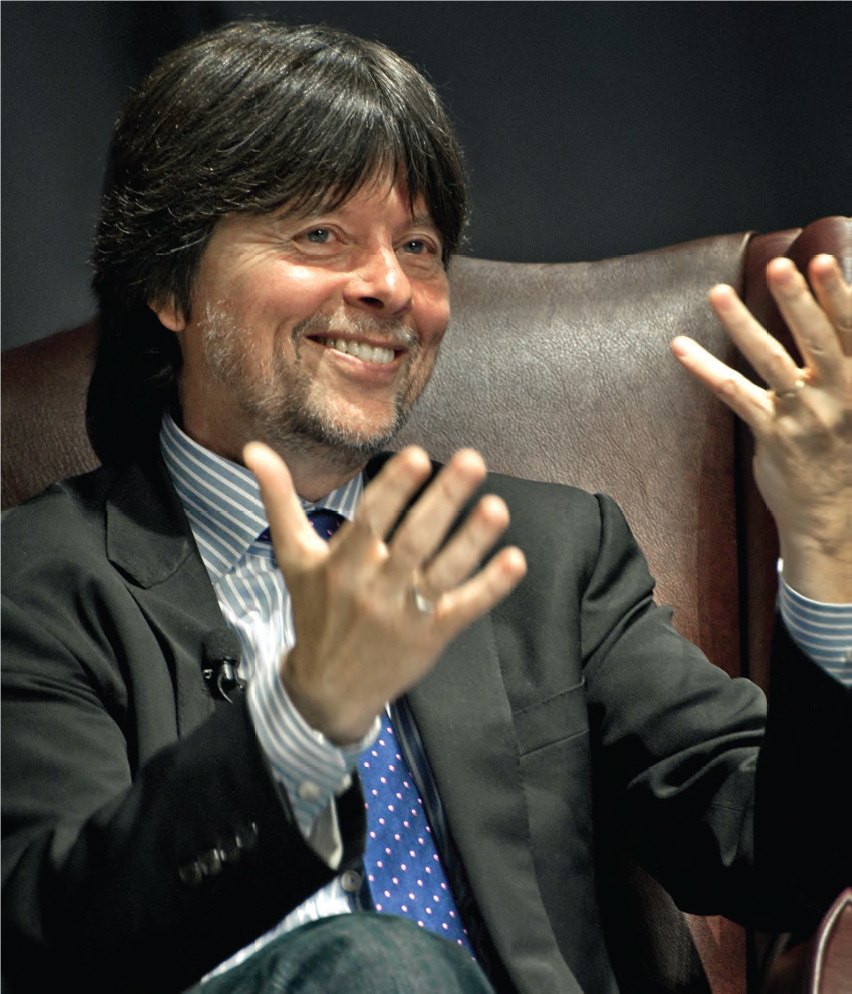Ken Burns is an old soul with the face of a choirboy and a gift for storytelling. He is especially passionate about American history, and his need to know is contagious. For the past 30 years, Burns has been a fixture on public television. From his early one-hour films profiling such landmarks as the Brooklyn Bridge and Statue of Liberty to his monumental miniseries on the Civil War, World War II, baseball, jazz, our national parks and the American West, he has captivated audiences with the fruits of his meticulous research and his drive to document the history of America through the hearts and minds of those who actually lived it. With as many as six films in production at one time, Burns travels the country filming, researching, lecturing and fundraising—ever mindful of the grassroots appeal of his work. October 2 marks the start of his three-part opus Prohibition, the latest miniseries from Burns and his longtime creative team—including producer director Lynn Novick and screenwriter Geoffrey C. Ward. Award-winning entertainment journalist Judith Trojan caught up with Burns in his New Hampshire production office.
EDGE: Historian Stephen Ambrose once said that more Americans get their history from you than from any other source. Do you set out to educate the public about American history or does it go deeper than that?
KB: I don’t know what would be deeper than educating the American public, but my first impulse is more modest: I just want to tell a good story. Because these are stories in American history, and often stories that have been neglected by the distractions of an all-consuming media culture, I think they then become significant educational tools.
EDGE: Historical dramas like The King’s Speech are extremely popular and win Oscars. Why devote your career to documentaries and not docudramas or dramatic fiction?
KB: I’ve been interested in the power of what’s true—the drama in what was and what is—without any human interference. For me, it’s looking at things that actually happen, and I don’t feel the need to change them.
EDGE: Back in the day, films about American history were dry as toast and earmarked for educational markets. Why do you think your films have wide audience appeal?
KB: One of the big reasons is I’ve had the great good fortune for 30 years to work in public broadcasting, emphasis on the word public. They don’t interfere with the process; so I enjoy creative control—though we are dependent upon the kindness of philanthropists in corporate, foundation and governmental circles that complete our budgets. Once you’ve removed yourself from the hurly-burly of fashion and really evolve your own authentic style, then people begin to trust that.
EDGE: Your films transformed the genre and became stylistic benchmarks for historical documentaries.
KB: Well, I’m not interested in excavating the dates and facts of the past—the dusty, dry archaeology that has turned so many people off—but in what I’ve called an “emotional archaeology.” The logical world of the head doesn’t allow much room for passion. Yet we also know how dangerous those baser emotions can be that transform history into nostalgia—something I’m absolutely not interested in. The glue that holds together all of the dates and facts in my films is a higher emotional energy. I notice that the things that compel us most in life—the relationships of those closest to us, the work we’re proudest of, our faith, our patriotism— prove that often one plus one equals three. It’s that wonderful contradictory calculus that I think art pursues that I hope to touch on in my films.
EDGE: Are you driven by your own desire to learn about a subject?
KB: Another reason those historical documentaries were so dry is because it was somebody telling you something they already knew rather than, as I hope in my  films, a process of discovery. I’m drawn to a subject not because I know about it and want to show off that knowledge or want to tell people what they should know about the subject, but the exact opposite. I want to share my process of discovery. It’s “Hey, let me tell you this unbelievable story I just heard!”
films, a process of discovery. I’m drawn to a subject not because I know about it and want to show off that knowledge or want to tell people what they should know about the subject, but the exact opposite. I want to share my process of discovery. It’s “Hey, let me tell you this unbelievable story I just heard!”
EDGE: April 12th marked the 150th anniversary of the start of the Civil War, and 21 years have passed since you premiered your groundbreaking miniseries. Has your mindset about the war changed in any way?
KB: I made the film because I was convinced the Civil War was the most important event in our nation’s history. There is nothing in the last 21 years that changed my mind. All of American history is in some ways governed by those four horrible years when, in order to become one, we tore ourselves in two. It’s the traumatic event in the childhood of our nation.
EDGE: Seventeen years elapsed between your coverage of the Civil War and World War II—the latter in your powerful 2007 miniseries The War. Why so long an interval?
KB: I vowed after The Civil War that I would not do another film on war. It was just very hard and emotionally painful to do it. But towards the end of the ’90s, I learned two awful facts: one, that we were losing a thousand WWII veterans a day; and two, that many graduating high school seniors thought we fought with the Germans against the Russians in the Second World War. I was appalled. I felt, for the reason that we were losing our soldiers and our historical compass, that I had to dive back into the subject of war.
EDGE: After completing two huge projects examining wartime America, did you come away with any life-altering insights?
KB: War is an interesting and troublesome subject. Americans—indeed, human beings—always forget the painful consequences of a war once it’s over. We begin to drape it with bloodless gallant myth. I think it’s the obligation of the artist to try to remind people of what actually takes place, which is in and of itself paradoxical. You, of course, find horrific aspects of human behavior; but also, you see stunning examples of bravery and courage, friendship and devotion, and loyalty and love that you weren’t expecting. So war has become the place at which a much more intensified study of human nature can occur. I’ve now committed to making a film on the history of Vietnam; and this will consume me, in every sense of that word, for the next six years.
EDGE: Your films consistently shine a light on unsung heroes.
KB: Oh, most definitely. I think one of the reasons American history seems like castor oil to so many people is that it’s usually reduced to a sequence of Presidential administrations punctuated by wars. The more engaging history is when that top-down version is balanced with a bottom-up version. I’ve tried to tell our histories from the bottom-up. What was happening to the individual private— North and South—in the Civil War? And in The War, WWII is reflected essentially through the eyes of people from four American cities: Waterbury, Connecticut; Mobile, Alabama; Sacramento, California; and tiny Luverne, Minnesota.
EDGE: Doris Kearns Goodwin’s quote at the end of The Tenth Inning, your latest series on baseball, beautifully sums up why the game is so enriching for the human spirit. She reminds us that we achieve immortality through our memories of communal activities.
KB: It’s so interesting that, in a way, we achieve our immortality through the stories told by the people that come after us. We keep our parents and grandparents alive that way, and then we too become those parents and grandparents whose lives are kept alive by the stories of their children. These are hugely important things; and they become the essential way in which human beings communicate with one another, whether it’s in documentary films or newspaper articles or on the street corner or over the backyard fence. If you tell history as if it’s over the backyard fence, you’ll have everybody’s ear.
EDGE: You’re now the father of two very young daughters, as well as two adult daughters.
KB: Yes, and I just became a grandfather! So my big girl, my baby, just had a baby.
EDGE: Another girl?
KB: Of course! That’s what we’ve been able to grow in the Burns house.
EDGE: Has having four daughters and now a granddaughter influenced your choice of subjects at all? There’s definitely a link between your latest miniseries, Prohibition, and your 1999 film about woman suffrage, Not for Ourselves Alone.
KB: The professional decisions are completely separate, but one ignores the role of women at one’s peril. I’m sure that’s in some way born from my experience living with lots of women who helped and influenced me.
EDGE: When people think of Temperance and Prohibition, Carry Nation immediately comes to mind; but many other women played pivotal roles.
KB: Yes, it was wives who went to their pastors to complain about their drunken husbands. It was women who fought not only for Emancipation for the slaves and a woman’s right to vote, but for Temperance. The highest-ranked woman in the U.S. government, Assistant Attorney General Mabel Walker Willebrandt, prosecuted Prohibition violators. And women were instrumental as flappers in flaunting the law and thumbing their noses at it. So it’s a wonderful story, which no one ever tells. I hope our film has been able to tell a much deeper story that at its heart engages women. And maybe that is my daughters speaking to me somehow.
EDGE: Prohibition seems to be a story about many people behaving badly. Did you have certain preconceived notions that were upended by the time you completed your research?
KB: It’s less upended than how superficial our knowledge of Prohibition is. We think of gangsters and Model-T’s careening through rain-slicked Chicago streets and tommy guns flashing and flappers and all of that stuff. That’s in our film, and it’s a very exciting and dynamic aspect of Prohibition; but the first hundred years before Prohibition went into effect are as essential to why it happened as anything, and we detail that in our film. This is a film about single issue political campaigns that kind of metastasized with unfortunate, unintended consequences. It’s about the demonization of immigrants. It’s about smear campaigns during Presidential campaigns. It’s about a whole group that felt like they’d lost control of the country and wanted to take it back. And those themes speak directly to what’s going on today without us having to point arrows at it.
EDGE: You grew up in a left-wing family. Has that had any affect on your work?
KB: No. I’ve struggled really hard to speak to everyone: red state, blue state, young, old, black, white, male, female, gay, straight, whatever. I’m interested in speaking to all of my fellow citizens and saying, “These are wonderful stories.” In a country in which civil discourse has decayed, history is still the table around which many of us can agree to come together. And that’s why I’ve been consciously and decidedly apolitical in my films.
EDGE: What about the use of social media today to connect diverse individuals and communities? Do you use it?
KB: I don’t use it. I’m an old fuddy-duddy and work way too hard and really don’t have the time. Everything’s a doubleedged sword. I think when we see how it’s enabled us to bond with people struggling for freedom in North Africa and the Middle East, we see its positive results. When we see how our children are consumed by social media to the extent that they can’t lift their eyes from their computers or their handheld devices to take a walk out in nature, we understand the pernicious effects. So, it’s very important to understand that everything under the sun has both negative and positive aspects. It’s our responsibility to reconcile those differences.
EDGE: If you were to compare yourself to any notable person in American history, who would it be? Have you felt a special kinship with any of your subjects?
KB: I feel a spectacular kinship with Louis Armstrong, Abraham Lincoln and Jackie Robinson; those three people are the bees’ knees for me. Now, would I compare myself to them? Never! I’ve had the great good fortune to spend a lot of time with them in the work that I do; and I feel that I’ve gotten to know them, even though they’re dead and I have not met them. I try my best to channel—if that’s the right word—the best of them to my fellow citizens to remind us of our greatest possibilities rather than our worst. These are the messages of love that Louis Armstrong gave us, of perseverance that Jackie Robinson displayed, and the wisdom and poetry that Abraham Lincoln exhibited. I’m proud to live in a country that had those three individuals as citizens.
Editor’s Note: Judith Trojan has written and edited more than 1,000 film and television reviews and celebrity profiles for books, magazines and newsletters. Her interviews have run the gamut from best-selling authors Mary Higgins Clark, Ann Rule and Frank McCourt to cultural touchstones Carroll O’Connor, Judy Collins and Caroll Spinney (aka Big Bird). Judy most recently helmed the Christopher Awards, a program that for the past 62 years has honored feature films, TV/cable programs, and books for adults and children that “affirm the highest values of the human spirit.”





